SKunk Control
Skunk Removal Services, When You Need It!
Humane Skunk Trapping & Relocation
Skunks do damage to yards and seek shelter under outbuildings, decks, and porches. Skunks love insects and will dig shallow holes all across your yard in search of food. Skunks are best known for their powerful smell. Did you know a skunk can shoot its sulfur-smelling spray up to 10 feet? Worse yet, the smell can linger for days and even weeks. We offer odor control solutions. Call 616-836-4255 today, and we’ll remove your skunks in a safe & humane manner.
Identification Of Skunks
Skunks are small furry creatures with black and white stripes on their backs. Some skunks have striped fur, while others have swirl patterns or are spotted. Regardless of the pattern, the black-and-white coloring serves as a warning to anyone who might harm this tiny creature. They have a powerful defense mechanism in the form of noxious odors produced by well-developed scent glands.
Skunks are usually the size of domestic cats. They can grow to be 8 to 19 inches long and weigh anywhere from 7 to 14 pounds. Their tail lengthens them by another 5 to 15 inches.
Habitat Of Skunks

Skunks aren’t particularly picky about where they live, but they prefer to be within two miles of water. Forested areas, grasslands, brush, open prairies, and developed areas are good places to look for them. Spotted and Striped Skunks share similar habitats, but Spotted Skunks are more likely to be seen in and around forests and woodlands, and they are less tolerant of human activity than Striped Skunks.
Skunks use underground dens all year to rest, hide, give birth, and rear their young. They can be found in rock crevices, culverts, drain pipes, and fallen hollow trees, as well as underwood and rock piles, buildings, porches, and concrete slabs. Skunks can dig their burrows, but they prefer to use burrows that other animals have abandoned.
What Attracts Skunks To A Home?
Skunks are opportunists at heart, preferring low-hanging fruit such as pet food left out at night and trash, as well as convenient denning sites like wood and rock piles, elevated sheds, openings under porches, and concrete slabs, and crawl spaces. Skunks won’t remain in the same location unless there is a steady source of food. Skunks will dig in lawns searching for food, and overwatered lawns typically contain large amounts of grubs (favorite food for skunks).
How To Prevent Skunk Infestations?
Preventative measures, such as removing attractants from the vicinity of homes, will reduce the likelihood of a skunk encounter. This includes covering window wells, securing trash cans, feeding pets indoors, or removing food immediately after they eat if fed outdoors.
When wet soil conditions push grubs close to the surface, skunks may dig for them in the yard; their presence could indicate an overwatered lawn. On the other hand, a skunk may wander into an open garage or shed on occasion, so keeping sheds and building secure is essential.
Signs Of Skunks On Your Property
If you have a lot of holes in your flowerbed, garden, or lawn, it could be a sign that a skunk den is nearby and skunks have been looking for grubs in your yard. Skunk holes are similar to squirrel holes in that they are small and shallow. It’s also more likely that you’ll smell a skunk rather than see one; skunks are nocturnal creatures who are rarely seen in broad daylight.
If persistent odors come from beneath a building or from a woodpile, a skunk may be lurking nearby. When trying to figure out if the creature is digging up (or stinking up), your yard is a skunk; looking for tracks can help: Skunks have five toes, and their claw marks in their tracks are usually visible. However, the best way to tell if a skunk has taken up residence in or near your house is to smell them.
Skunk Damage To The Home

Skunk odors travel upward through flooring and carpeting and can last for up to six months. Even after the skunk has left, the problem often persists due to the scent remaining in the materials brought in by the mother skunk to build her nest.
The primary source of damage from a skunk infestation is their characteristic odor, but it is not the only way they can become a nuisance. They may go to great lengths to access a crawl space if they believe it is an ideal home site. They may tear vent screens to gain access to the protected areas if necessary and will chew through wood siding to gain access to the nesting site or dig a burrow.
Skunks have been known to burrow under solid foundations, causing thousands of dollars in damage if the foundation and other structural elements crack or shift.
If a skunk has established a comfortable home beneath a house, it may stay there for several seasons without bothering the residents above. Skunks usually only come out at night to feed, so unless there is an odor problem, it may go unnoticed.
Given a skunk’s pattern of tenancy, as well as its penchant for discretion, it’s a good idea to keep an eye out for signs. A sniff test could reveal something, or some telltale signs in the garden could alert you. If this action raises suspicion, have it verified by an animal control professional.
Diseases Carried By Skunks
Skunks can transmit contagious diseases, viruses, and parasites to humans or pets. The following are some of the most serious illnesses:
- Rabies
- Hepatitis
- Distemper
- Leptospirosis
- Roundworm
In the Midwest, skunks are the most common rabies carriers. Rabies is usually fatal to humans and pets if they are not treated right away. If you suspect a skunk has rabies, don’t approach it; instead, contact wildlife control right away. Skunks can have two types of rabies: the “furious” form, in which they become aggressive, and the “dumb” form, in which they become unaffected by human presence. Other rabies symptoms to watch for in skunks include daytime activity, an unsteady or disoriented gait, drooling, or foaming at the mouth.
Skunk Control & Prevention Options

Best Way Animal Removal uses the most effective and safest skunk control methods available when it comes to getting rid of skunks around homes. Trapping has proven to be the most effective method of skunk control. Our experts recommend cleaning up areas of the property such as woodpiles and food sources to help keep the skunks away and prevent future skunk control issues.
Even though skunk encounters are relatively common, this nuisance wildlife species should never be handled without a professional’s assistance. Skunks spray when they are threatened, and the odor is difficult to remove and causes severe irritation to the skin and eyes. Professional wildlife specialists have the knowledge, tools, and training to solve skunk problems humanely and effectively, so calling in a wildlife specialist is essential for proper skunk removal.
Skunk Removal Process
All of our wildlife removal services are done humanely and with the safety of both the homeowner and the animal in mind. The skunk trapping and relocation process include:
- Best Way Animal Removal will send a skunk removal expert to your property to conduct an in-depth assessment of your skunk infestation.
- The assessment will help the wildlife removal expert form an effective skunk control plan.
- Live traps will be set near the skunks’ den for the best odds of trapping success.
- Once all the skunks are trapped, their nests are removed, and the skunks are relocated far from your home.
- A final inspection will be performed to identify possible entry points the skunks were utilizing. Our animal removal professional will seal the exposed entry points.
- Our wildlife control expert will inform you of exclusion devices and repairs that can be performed to prevent skunks from returning.
Have A Skunk On Your Property?
If a skunk has made its home on your property, it’s advised to contact a wildlife control professional right away. Allowing the skunks to stay only puts homeowners and pets at risk of being sprayed. Contact Best Way Animal Removal today, and we will form a trapping plan to remove the skunks right away.
Areas Serviced For Skunk Removal & Prevention
Allegan County, MI
Allegan, Douglas, Fennville, Holland, Hopkins, Martin, Otsego, Plainwell, Saugatuck, South Haven, Wayland
Kent County, MI
Byron Center, Caledonia, Casnovia, Cedar Springs, Comstock Park, Cutlerville, East Grand Rapids, Forest Hills, Grand Rapids, Grandville, Kent City, Kentwood, Lowell, Northview, Rockford, Sand Lake, Sparta, Walker, Wyoming
Muskegon County, MI
Casnovia, Fruitport, Lakewood Club, Montague, Muskegon, Muskegon Heights, North Muskegon, Norton Shores, Ravenna, Roosevelt Park, Twin Lake, Whitehall, Wolf Lake
Ottawa County, MI
Allendale, Beechwood, Coopersville, Ferrysburg, Grand Haven, Holland, Hudsonville, Jenison, Spring Lake, Zeeland
